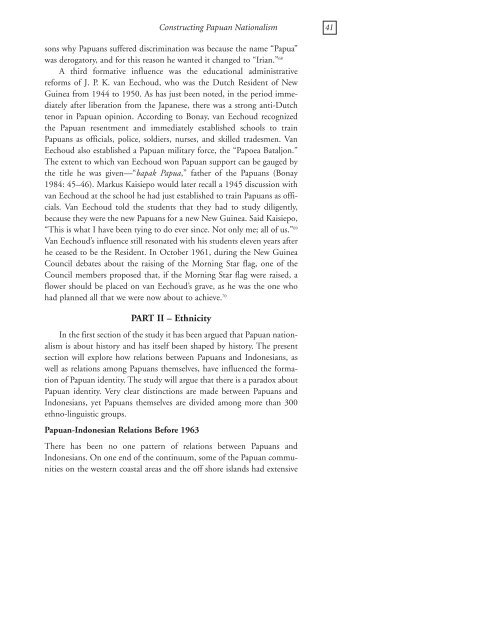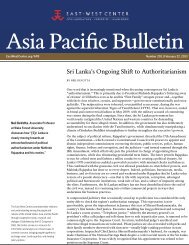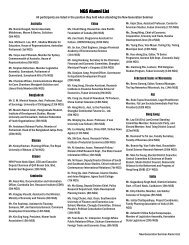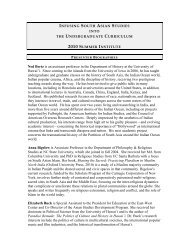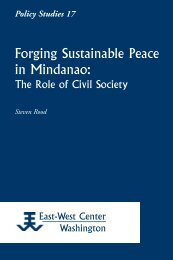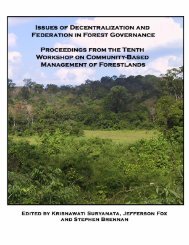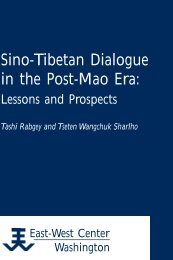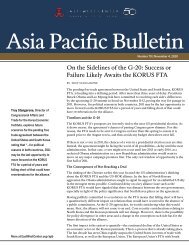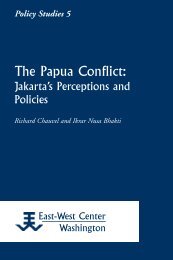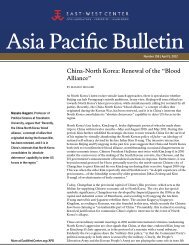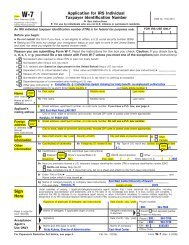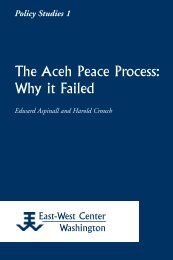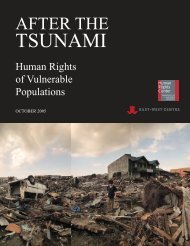Constructing Papuan Nationalism: History, Ethnicity ... - ScholarSpace
Constructing Papuan Nationalism: History, Ethnicity ... - ScholarSpace
Constructing Papuan Nationalism: History, Ethnicity ... - ScholarSpace
- No tags were found...
You also want an ePaper? Increase the reach of your titles
YUMPU automatically turns print PDFs into web optimized ePapers that Google loves.
<strong>Constructing</strong> <strong>Papuan</strong> <strong>Nationalism</strong> 41sons why <strong>Papuan</strong>s suffered discrimination was because the name “Papua”was derogatory, and for this reason he wanted it changed to “Irian.” 68A third formative influence was the educational administrativereforms of J. P. K. van Eechoud, who was the Dutch Resident of NewGuinea from 1944 to 1950. As has just been noted, in the period immediatelyafter liberation from the Japanese, there was a strong anti-Dutchtenor in <strong>Papuan</strong> opinion. According to Bonay, van Eechoud recognizedthe <strong>Papuan</strong> resentment and immediately established schools to train<strong>Papuan</strong>s as officials, police, soldiers, nurses, and skilled tradesmen. VanEechoud also established a <strong>Papuan</strong> military force, the “Papoea Bataljon.”The extent to which van Eechoud won <strong>Papuan</strong> support can be gauged bythe title he was given—“bapak Papua,” father of the <strong>Papuan</strong>s (Bonay1984: 45–46). Markus Kaisiepo would later recall a 1945 discussion withvan Eechoud at the school he had just established to train <strong>Papuan</strong>s as officials.Van Eechoud told the students that they had to study diligently,because they were the new <strong>Papuan</strong>s for a new New Guinea. Said Kaisiepo,“This is what I have been tying to do ever since. Not only me; all of us.” 69Van Eechoud’s influence still resonated with his students eleven years afterhe ceased to be the Resident. In October 1961, during the New GuineaCouncil debates about the raising of the Morning Star flag, one of theCouncil members proposed that, if the Morning Star flag were raised, aflower should be placed on van Eechoud’s grave, as he was the one whohad planned all that we were now about to achieve. 70PART II – <strong>Ethnicity</strong>In the first section of the study it has been argued that <strong>Papuan</strong> nationalismis about history and has itself been shaped by history. The presentsection will explore how relations between <strong>Papuan</strong>s and Indonesians, aswell as relations among <strong>Papuan</strong>s themselves, have influenced the formationof <strong>Papuan</strong> identity. The study will argue that there is a paradox about<strong>Papuan</strong> identity. Very clear distinctions are made between <strong>Papuan</strong>s andIndonesians, yet <strong>Papuan</strong>s themselves are divided among more than 300ethno-linguistic groups.<strong>Papuan</strong>-Indonesian Relations Before 1963There has been no one pattern of relations between <strong>Papuan</strong>s andIndonesians. On one end of the continuum, some of the <strong>Papuan</strong> communitieson the western coastal areas and the off shore islands had extensive


